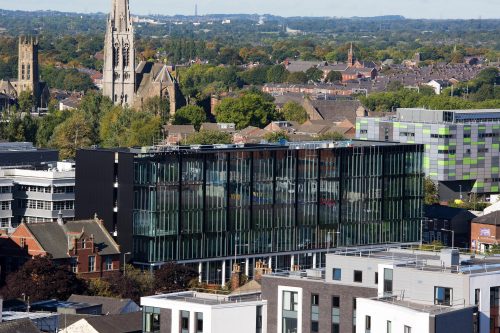Delivering a step change in training

The new £35m state-of-the-art Engineering Innovation Centre (EIC) on the University of Central Lancashire’s Preston campus is set to open its doors – and its role in the North West’s economic future cannot be underestimated.
The building is a striking example of the growing collaborative approach between the worlds of education and business in the drive to tackle the region’s skills challenges.
As Professor Ian Allison, executive dean at the faculty of science and technology, explains: “It is about supporting new generations of engineers and shaping the future of skills development in our city, as well as Lancashire and the North West as a whole.”
The integrated teaching and research space is anticipated to deliver a “step change” in producing locally trained graduates in areas including aerospace, mechanical and energy technologies and engineering.
Staff, students, and companies across the North West will have access to top-of-the-range equipment including flight simulators, Formula One cars and specialist electronic labs.
The EIC has been identified as a signature project within Lancashire’s Strategic Economic Plan.
One of its objectives is helping increase the number of women in engineering.
What is also important is the fact that EIC has been developed with the involvement of employers across the region.
They have helped on its development and its design and university chiefs stress they will continue to play “a significant role” in the operation of the new facility once it is open.
The EIC will allow students to work on live, real-world projects with commercial partners.
It is work that is already underway and delivering headline-making results.
UCLan engineering students have been involved in the Juno project, the world’s first graphene-skinned plane which was unveiled at last summer’s Farnborough Air Show.
Juno was built on the Preston campus and the EIC is set to become a central location for the continuation of this world-leading research.
Much of that work is looking at ways to incorporate graphene into the build structure of aeroplanes to reduce weight and increase impact strength.
Prof Allison says: “Within Lancashire, Preston’s historical strength has been in manufacturing and engineering, our aim for the EIC is to help ensure we are at the forefront of the new ‘digital’ industrial revolution.”
He adds: “What we’re also enthused about is the excitement and willingness of industry partners to get involved from a variety of sectors including automotive, aerospace, oil and gas, and energy.
“This has been one of the defining features of the EIC since the initial discussions began and we look forward to working with our partners to create the engineers of the future.”
Iain Martin is engagement manager at the EIC. He says: “This is a facility for the region as well as the university.
“Our aim is to bring together teaching, research and business engagement. Private sector input is key.”
The university’s work on Juno highlights that this input is already happening.
Its aerospace engineering team has worked in partnership with the Sheffield Advanced Manufacturing Research Centre (AMRC), Manchester’s National Graphene Institute (NGI), Haydale Composite Solutions and a range of other businesses to develop the unmanned aerial vehicle which also includes graphene batteries and 3D printed parts.
As well as the Juno project it is also exploring the practical applications of exploiting graphene to boost the UK’s space industry.
This initiative is being achieved through the launch of specially designed graphene-enhanced carbon fibre material into near space using high altitude balloons.
The UCLan team believes that graphene, in combination with other materials, could allow satellites to be lighter, reducing the costs of launching them into space and making them more robust against the impacts of space debris.
The skills agenda is also part of Lancaster University’s new £44m Health Innovation Campus (HIC).
Emerging out of the ground on a site near the university’s main campus, once open it will bring together businesses with researchers and health providers to work together on solving significant health problems.









